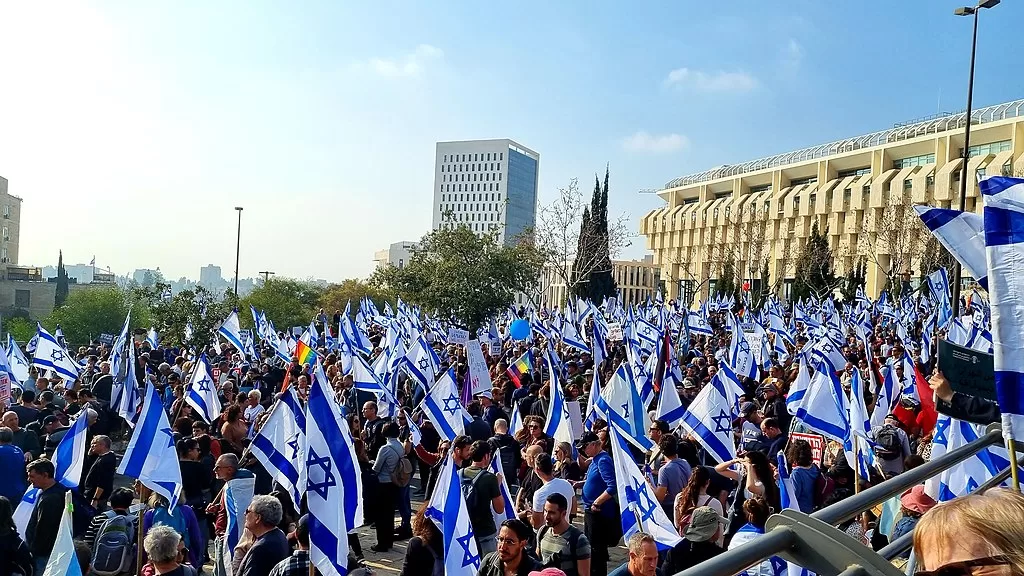Almost six months to the day since the outbreak of war between Israel and Hamas, the Israeli government made a decision to shutter the Al Jazeera bureau in Jerusalem. The Knesset vote was an overwhelming 71-10. “The ability of the Communications Minister to shutter press for political motivation is a complete and utter threat to democracy in Israel,” said Noa Sattath, the director of the Association for Civil Rights in Israel (ACRI), Israel’s leading human and civil rights organisation. “We want a journalist to be thinking about the truth, not about what a minister is thinking about them—this is a chilling effect. “
In addition to the attack on freedom of expression and freedom of the press, the new law also effectively precludes the court from intervening in decisions regarding the closure of media outlets. In addition to closing Al Jazeera’s offices, the law allows removing its website and confiscating the device used to deliver its content. Al Jazeera, termed a “propaganda machine” not a news organisation by many in the Israeli government, was an easy target perhaps, especially during wartime, but it is especially in wartime that a democracy’s fortitude is tested.
In a new sixth-month survey of the impact of the war on human and civil rights in Israel, ACRI makes these points: “Even before the terrorist attack Hamas perpetrated on 7 October, and before the war broke out, Israeli democracy was facing severe threats. Combined together, laws designed to take over the judicial system [what Prime Minister and his government called ‘judicial reform’, but what opponents called a ‘judicial coup’ attempt] and a slew of other initiatives in different areas crystallised to produce a judicial overhaul, as part of which the government sought to undermine the pillars of democracy and reduce human rights protections. Some initiatives to take over the judicial system have been put on hold since the war began, partly because this was put forward as a condition for expanding the government [by member parties]. Other initiatives that threaten democracy have also been suspended.”
Yet, there are enough new curbs and potential curbs on human and civil rights to warrant a 14-page document from ACRI. Sattath, the ACRI director, explains: “The government has pushed forward with existing trends such as targeting Arab society, restricting freedom of movement, increasing the prevalence of firearms in public spaces, and accelerating the annexation of the West Bank. Given the general climate in a time of war, these efforts are met with less resistance. In other fields, such as prisoners’ rights, the state of human rights has taken a significant turn for the worse, while the public remains entirely indifferent. Human rights violations are often carried out via emergency regulations (Hebrew), an undemocratic tool that allows the government to enact laws, seriously violating the principle of separation of powers.”
In addition to the actual censoring of media, the mainstream media has self-censored in Israel, aware of—and even setting—the tone among the public. Nightly newscasts cover soldiers in the field, the hostages, and other security concerns but rarely focus on the situation for Palestinians, including the humanitarian concerns in Gaza.
Additionally, people have been detained by the police for a “like” on social media after the Ministry of Justice removed the State Prosecutor’s oversight on charges for offences of freedom of expression during the war, so that police don’t need approval before investigating such cases. Police were directed to detain people for social media posts until the proceedings’ end and prosecute them even for a single publication. This change led to a surge in arrests of Arab citizens regarding social media posts; arresting without cause.
Meanwhile, there is a proliferation of widespread hate speech online incriminating Jewish social media spots promoting hate against Arabs, but enforcement disproportionately targets Arab citizens and residents.
By November, there were 269 investigation cases for incitement and support for terrorism, resulting in 86 expedited indictments for incitement to violence and terrorism. Suspects faced prolonged detention and even remand until trial, a departure from due process.
Additionally, there are significant violations of policing of peaceful demonstrators, along with unlawful detentions of protesters and unauthorised visits to the houses of suspected protest organisers by the police. The police (which is federalised in Israel), led by far-right minister Itamar Ben Gvir, seem to be pre-imagining what steps he anticipates for them and taking them–all with no retribution so far.
Security prisoners in Israeli prisons have faced much worse, with protocols, including lawyers’ visits, upended. Meanwhile, there is a proliferation of guns in the streets with a free-for-all dispensation by Ben Gvir’s office to create private militias both inside Israel and in the Occupied Palestinian Territories where actions by Jewish settlers against Palestinian residents have multiplied.
These are just a few key examples of what Israelis are facing. Even when the war ends and when the current government falls, much of the backtracking in Israeli society will be hard to reverse.





